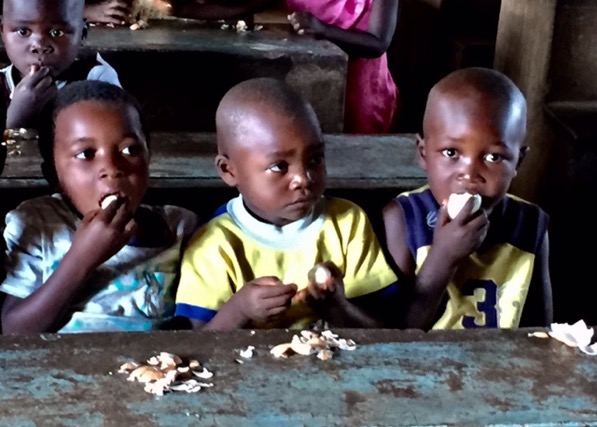For 10 years, UNC and UNC Project-Malawi have provided food and an education for nearly 1,000 pre- and primary school children in the Dzama community outside of Lilongwe, Malawi. Learn how this support has impacted the community and what UNC hopes to achieve in 2017.

Students at the Dzama Primary School outside of Lilongwe, Malawi, subscribe to a powerful set of beliefs:
“To be happy:
Free your heart from hatred.
Free your mind from worries.
Live simply. Give more.
Expect less.”
Nearly 1,000 children attend the Dzama preschool and primary school. Many of the students are orphans who lost their parents to the AIDS epidemic. Others hail from households where families earn less than $2 a day. A simple breakfast of fortified porridge with milk is provided to each student. A lunch of a boiled egg is given to each of the 300 preschoolers. These can be the only meals these children eat all day. They have many reasons to be bitter or sad, yet the children greeted a recent group of faculty from UNC’s Division of Infectious Diseases and UNC Project-Malawiwith warm smiles and joyful songs.
“Malawi is known as the ‘Warm Heart of Africa’ and that spirit is alive and well at the Dzama School complex,” said Irving Hoffman, MPH, PA, International Director of UNC Project-Malawi . “I have visited Dzama on several occasions per year and each time, the teachers and the representatives from the community welcome us, literally, with open arms. This warm welcome is not because they know we are the group that helps the education and feeding program; it is because we are visitors and that is how a visitor is welcomed – with joy and respect. The Dzama community has limited resources, but they do not lack grace and civility.”
Over the past 10 years, staff and faculty from UNC Chapel Hill and UNC Project-Malawi have donated time and money to the Dzama community. These efforts led to the construction of the school buildings, the feeding center, a well and a toilet. In 2016, donations supported the:
- Feeding program Continued the morning fortified porridge with milk meal to 800 students (300 preschool children and 500 primary school children) Provided 300 preschool children with one boiled egg per day
- Personnel Provided salary support for three teachers
- School supplies Purchased pencils, pens, notebooks, reference books, office chairs and tables for the headmaster and teachers
- Infrastructure maintenance Maintained solar power lighting Completed general maintenance for three classrooms and the feeding center
- Orphan secondary education Paid secondary school fees for 10 promising children
- Environmental investment Started a re-forestation project with tree planting on the property surrounding the school
“The food and education program is very beneficial to this community because it gives the children a head start,” said Innocent Mofolo, MSc, Associate Country Director of UNC Project-Malawi. “The Dzama community has a lot of orphaned and vulnerable children who come from from families that are food insecure. For some of them, the school meal is the only decent meal that they get in a day. The eggs are the only source of protein for most of the kids. We have noticed the feeding program prevents growth stunting among the children. The community is happy to help with the cooking and cleaning as part of their contribution to this initiative.”
Expanding the feeding program to provide an egg a day for each of the primary school children is one goal for 2017 fundraising efforts. The UNC team would also like to build an additional primary school room and feeding center as well as purchase a gas stove and gas to prevent further deforestation through wood burning. These improvements are estimated to cost $91,000 through 2018.
The Dzama project has received $51,000 in challenge funding toward this $91,000 goal, but the remaining $40,000 still needs to be raised. To make a donation, visit http://giving.unc.edu/gift/custom/index.htm?fndpic=348858&p=medf
